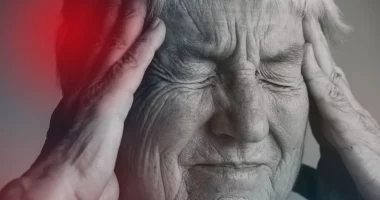Cerebellar degeneration is a condition where the cerebellum, the part of the brain responsible for coordination and balance, gets damaged. This condition is not very common and can happen because of certain increasing neurological disorders or brain injuries, like a stroke.
When the cerebellum degenerates, it leads to a movement disorder known as ataxia. Ataxia is characterized by shaky or unsteady movements, impaired balance, and trouble performing precise actions.
Some forms of cerebellar ataxia might be treated, but all cases of cerebellar degeneration need medical attention. Treatment often includes physical therapy and the use of supportive things to assist enhance movement and prevent falls or injuries.
Symptoms
Cerebellar degeneration affects the cerebellum, leading to a different symptom that impairs coordination. These symptoms can appear suddenly or develop gradually, and individuals may experience some or all of them.
Common symptoms include nystagmus, which involves movements of the eye that happen to be jumping. Another symptom is ataxia, characterized by badly coordinated movements of the legs, arms, or body. People with cerebellar degeneration may also experience titubation, where the head shakes or bounces while at rest or during movement, and ataxic speech, which involves uneven rhythm while talking.
Other symptoms include diplopia and vertigo, a sensation that the body is turning or the room is spinning, often accompanied by a sick feeling of stomach or vomiting. Light-headedness, often related to abnormal movements of the eyes, and gait imbalance, which makes walking, standing, or sitting upright difficult, are also common.
These signs can significantly impact daily life, making it challenging to perform tasks like self-care, walking, climbing stairs, eating, or carrying objects. As cerebellar degeneration increases, it can lead to a decline in independence, eventually making it difficult or impossible to live without assistance.
Causes
Cerebellar degeneration can result from a variety of factors, though the condition is relatively rare. The primary causes include neurodegenerative disorders, hereditary diseases, brain injuries, infections, and exposure to toxins, all of which can damage cerebellum cells.
Occasionally, cerebellar degeneration happens alongside other kinds of brain damage or systemic diseases. Here are some of the key causes:
Alcohol
Chronic alcohol consumption can be toxic to cerebellar cells, causing gradual degeneration of the cerebellum.
Stroke
Although uncommon, a stroke in the cerebellum can occur if the blood supply to the cerebellar arteries is interrupted, leading to brain damage.
Encephalitis
This inflammation or infection of the brain might impact the cerebellum. Although encephalitis is rare, it can occur in individuals with compromised immune systems.
Paraneoplastic Syndromes
Particular cancers, like ovarian cancer, can trigger the production of antibodies that mistakenly trigger the cerebellum or other areas of the nervous system. In some cases, neurological signs appear prior to the cancer is determined.
Multisystem Atrophy
A degenerative neurological disorder, MSA leads to the progressive deterioration of the cerebellum and other brain regions, causing symptoms like ataxia and dementia. The exact cause of MSA is unknown.
Spinocerebellar Ataxia
This group of uncommon genetic disorders can be hereditary and leads to progressive degeneration of the spinal cord and cerebellum. There are several kinds, each causing similar symptoms.
Creutzfeldt-Jakob Disease
CJD is caused by prions, abnormal protein particles that lead to brain damage. It can sometimes be transmitted through contact with damaged nerve tissue.
Additionally, there are several uncommon cerebellar syndromes, some of which occur in childhood and others in adulthood. These conditions are often idiopathic or genetic. The cerebellar mutism, results from damage to the pathways connecting the cerebral cortex and cerebellum.
Diagnosis
Diagnosing cerebellar degeneration involves a combination of clinical evaluation and imaging of the brain, along with blood tests to identify the underlying cause.
The process starts with a discussion with your doctor about your medical history and symptoms. This is followed by a comprehensive physical examination, involving a detailed neurological test. The examination may reveal symptoms like nystagmus, ataxia, and difficulty walking.
Additionally, the healthcare provider will assess other aspects like muscle strength, reflexes, and sensation to determine if there is a basic cause, like a stroke or multiple sclerosis (MS).
A key part of the diagnostic process is brain imaging, usually done with a magnetic resonance imaging scan, which gives detailed images of the cerebellum and can help identify any abnormalities. Blood tests may also be conducted to check for specific conditions, like paraneoplastic antibodies, which can indicate an autoimmune response linked to certain cancers. These tests help pinpoint the exact cause of the cerebellar degeneration, guiding further treatment and management.
Treatment
The treatment for cerebellar degeneration varies widely due to its many causes. Regardless of the specific cause, individuals with cerebellar ataxia generally benefit from physical therapy and safety measures to prevent traumas. For acute exacerbations of multiple sclerosis, high-dose steroids are often used, and disease-modifying therapies can help prevent further relapses and neurological decline.
In cases of paraneoplastic cerebellar degeneration, surgical elimination of the tumor may improve symptoms or stop them from worsening. For encephalitis, anti-inflammatory medications are typically used, and if the condition is caused by an infection, antibiotics or other treatments targeting the infectious agent may be necessary.
Complications
The movement problems led by cerebellar degeneration, known as ataxia, can significantly increase the chance of falls and traumas. This is because ataxia affects your coordination and balance, making it harder to move around safely. To manage these risks, it’s important to work closely with your family and healthcare provider. They can help you create a safer environment at home, suggest exercises to improve your balance, and recommend devices or equipment that can aid in preventing falls. Taking these precautions can help decrease the chance of injury and make daily activities safer and more manageable.
Outlook
The outlook for cerebellar degeneration largely depends on its underlying cause.
For those with alcohol-related cerebellar degeneration, stopping alcohol consumption can prevent further damage, but the existing effects are usually irreversible.
If cerebellar degeneration results from a stroke, the condition generally stabilizes unless another stroke happens. It’s crucial to identify risk factors for stroke and implement prevention strategies as part of the get-well plan.
In cases where multiple sclerosis involves the cerebellum, the outlook varies based on the overall progression of the disease. Some individuals may experience improvement in symptoms, while others may have long-term challenges.
For neurodegenerative diseases like multisystem atrophy and Creutzfeldt-Jakob disease, the outlook is typically poor, with progressive decline in function that can eventually be life-threatening.
Summary
Cerebellar degeneration is a condition where the cerebellum is damaged, leading to symptoms like balance issues, ataxia, and coordination problems. The causes vary, including strokes, infections, alcohol, and neurodegenerative diseases. Diagnosis involves clinical exams, imaging, and blood tests. Treatment options depend on the cause and may include physical therapy, medications, or surgery. Complications primarily involve an increased risk of falls and injuries. The outlook varies based on the underlying cause, with some conditions stabilizing while others progressively worsen.








